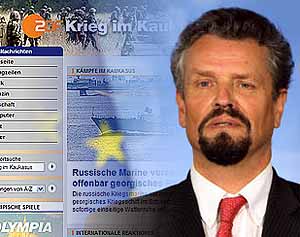12.08.2008
August 11, 2008 (the date of publication in Russian)
Alexander Rublev
SOUTH OSSETIA ON THE SCALES
Will Germany convince its European neighbors that principles and values are prior to geopolitical expediency?
 The tragic events of August 8, when Georgia carried out an act of massive ethnic cleansing, exterminating two thousand civilians in the breakaway South Ossetia, seemed to be unnoticed in Europe. At the session of the UN Security Council, European representatives were reluctant to publicize any judgments, referring to the necessity "to study the situation in details". However, as soon as Russia intervened to cease the carnage, European observers woke up and declared in a chorus that the Russian Federation cannot serve as an intermediate between the two sides of the conflict.
The tragic events of August 8, when Georgia carried out an act of massive ethnic cleansing, exterminating two thousand civilians in the breakaway South Ossetia, seemed to be unnoticed in Europe. At the session of the UN Security Council, European representatives were reluctant to publicize any judgments, referring to the necessity "to study the situation in details". However, as soon as Russia intervened to cease the carnage, European observers woke up and declared in a chorus that the Russian Federation cannot serve as an intermediate between the two sides of the conflict.
Naturally, the first European voices to damn Russia emerged from the triad of Baltic new members along with Poland's President Lech Kaczynski. The chorus was joined by Finland – shortly after Russia raised the custom duties for timber for this country Ц and followed by French Foreign Minister Bernard Kouchner. The tragedy of the Ossetian people was regarded by the mentioned political sides as something insignificant, as compared to the national integrity of Georgia. Curiously, the same "anti-separatists" were more than sympathetic to Chechen secessionists eight years before.
Russians hardly had any illusions about interpretation of the Tskhinvali tragedy in European mass media Ц as well as the about the official view of the European establishment that had many times displayed double standards in approach towards Russia and the selected post-Soviet regimes Ц labeled "democratic" only due to pro-Western orientation of their leaders, regardless from their political and personal behavior. These particular states, namely, Georgia, Ukraine, Lithuania, Latvia, and Estonia, had been permanently displayed in European press as innocent victims of Russian pressure, and simultaneously, a useful instrument for establishing alternative energy delivery Ц though in case of Ukraine, this delivery turned thievery, while the Baltic states spent years conveniently parasitizing on Russian Ц not "alternative" Ц transit of raw materials.
Still, in the Russian view, the European community, with its humanist background, adheres to certain humanitarian standards. Therefore, the Tsveli Minda ("Clean Field") operation of Tbilisi was supposed to arouse some echo in the heart of a civilized European, especially at the moment when a Georgian tank fired over the sights at a hospital or kindergarten, its all-steel tracks rolling across bodies of old men and kids.
Days before, a number of European leaders sent messages to Moscow, bemoaning the deceased Alexander Solzhenitsyn and speculating on Dostoyevsky, humanism, and conscience. The same sensitive intellectuals were now dumb before the humanitarian catastrophe in Tskhinvali.
The only European politician who unambiguously criticized the behavior of Georgia was Germany's State Minister Gernot Erler. Qualifying the Georgian crackdown on South Ossetia as an example of infringement on the rights of a people, Erler emphasized that he understands the reaction of Moscow to the events in the adjacent territory. In Moscow, many experts were surprised to hear this view from a Christian Democrat, with a reputation of a hardliner vis-à-vis Russia. Shortly later, Russian media broadcasted the statement of German Chancellor Angela Merkel who expressed her concern about the civil population of South Ossetia Ц a rare exception among European leaders.
Certainly, German politicians are informed about the situation in Georgia and in the breakaway autonomies much better than their colleagues. Dieter Boden, one of the most experienced and educated European diplomats, had spent years in a search of a peaceful outcome of the conflict between Tbilisi and the unrecognized states of Abkhazia and South Ossetia. In January 2008, he was brave enough to tell in public that the latest presidential elections in Georgia were rigged, and that Saakashvili prolonged his tenure by means of swindle and forgery. The idea of the compromise, proposed by Foreign Minister Frank-Walter Steinmeier, was based on the experience of German diplomacy in the area.
However, the special opinion of Germany was motivated not only with better knowledge. The conceptual approach of the German establishment, denouncing the US invasion into Iraq, is based on rejection of brutal methods of "export of democracy" used by the United States. The new EU members that demonstrated, on the contrary, their compliance to these methods, were hostile to Germany for its reluctance to share the American geopolitical line.
Will Germany manage to explain to its EU partners, at least to the nations of "Old Europe", that principles and values are prior to geopolitical expediency at the face of a carnage of civilians? We'll probably know more after the round of talks between Angela Merkel and Russia's President Dmitry Medvedev in Sochi, scheduled for August 15.
Number of shows: 1319
 ENG
ENG 

 ENG
ENG 
